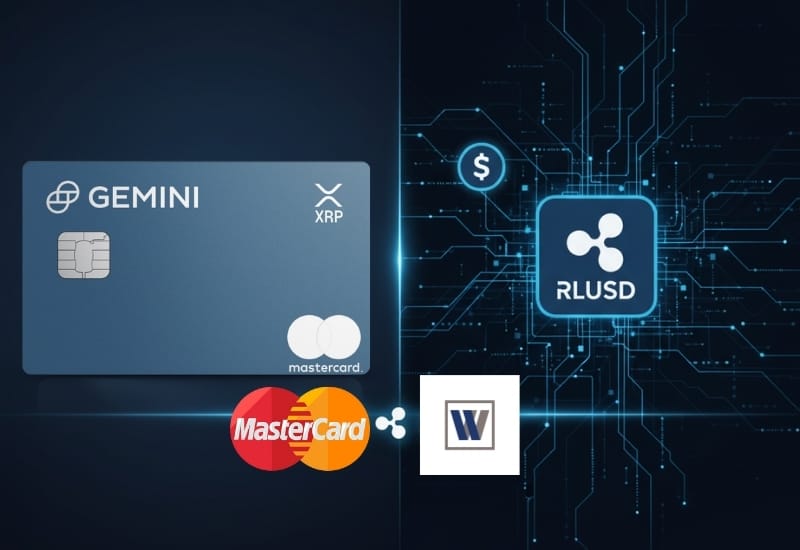Ripple, Mastercard Partner on Blockchain Credit Card Settlement
Ripple partners with Mastercard, WebBank & Gemini to pilot RLUSD stablecoin settlement for credit cards on XRP Ledger. Could revolutionize payment infrastructure pending regulatory approval. Full analysis inside.

Ripple announced at its Swell 2025 conference that it's collaborating with Mastercard, WebBank, and Gemini to pilot stablecoin-based settlement for credit card transactions using RLUSD on the XRP Ledger. This initiative could mark one of the first times a regulated U.S. bank settles traditional card payments using a regulated stablecoin on a public blockchain.
The announcement comes on the heels of Gemini's elimination of maker fees for RLUSD trading pairs—with makers paying 0% and takers paying just 0.01% on RLUSD/USD markets—and the August 2025 launch of the XRP Edition of the Gemini Credit Card.
What's Actually Confirmed
According to CoinDesk, Ripple's official media partner at Swell 2025, WebBank will explore settling Mastercard transactions using RLUSD on the XRP Ledger. RLUSD is a U.S. dollar-backed stablecoin launched in December 2024 under a New York Trust Charter, fully backed by cash and cash equivalents, and regulated by the New York Department of Financial Services.
The stablecoin recently surpassed $1 billion in circulation, achieving this milestone in less than one year. Ripple President Monica Long stated the initiative aims to "bring blockchain speed and efficiency into the back-end of a payment flow consumers already know—swiping a credit card."
The companies will begin onboarding RLUSD to the XRP Ledger in the coming months, pending regulatory approvals. A Ripple spokesperson emphasized to Decrypt that "regulatory approval is a key part of this effort" and the initiative "will move forward only once the necessary approvals are in place."
Potential Impact on Traditional Finance
If implemented following regulatory approval, this pilot could replace the slower settlement rails banks currently use. Traditional credit card transactions take one to three days to clear between a merchant's bank and card issuer. RLUSD settlement could theoretically move funds nearly instantly, particularly for cross-border transactions.
Mastercard has explored stablecoin payments previously and describes this project as part of its broader effort to integrate regulated digital assets into its global network.
XRP and Ripple Ecosystem Implications
This development builds on the existing partnership between Gemini, Ripple, and WebBank, which produced the XRP Edition of the Gemini Credit Card in August 2025. That card offers up to 4% back in XRP on gas, EV charging, and rideshare purchases, backed by a $75 million joint investment between Gemini and Ripple.
Important note: While the new settlement initiative would apply to transactions on all Gemini Credit Cards (including Bitcoin and Solana versions), the announcement focused specifically on backend settlement infrastructure—not consumer-facing features. The settlement occurs between financial institutions, separate from the customer experience of swiping their card.
For the XRP ecosystem, this represents institutional validation of the XRP Ledger's infrastructure capabilities. Major institutions including abrdn, Braza Bank, and Société Générale-Forge have already adopted XRPL technology for payments and cross-border settlements.
The announcement coincided with Ripple's $500 million fundraising at a $40 billion valuation, led by Fortress and Citadel Securities, demonstrating sustained institutional confidence in the company's long-term strategy.
Regulatory and Market Context
This initiative arrives during a period of improved regulatory clarity for Ripple following its legal developments with the SEC, which classified XRP as a utility token in secondary markets in August 2025. The timing aligns with growing institutional interest in regulated stablecoin applications within traditional financial infrastructure.
However, potential investors and observers should note that the pilot program's success depends entirely on obtaining necessary regulatory approvals, and there is no confirmed timeline for full implementation.
Bottom Line
Ripple's collaboration with Mastercard and WebBank represents a significant step toward integrating regulated stablecoins into traditional payment infrastructure. While the technical pilot is now underway, actual implementation awaits regulatory approval. This initiative could establish RLUSD as a viable settlement layer for institutional payments, but practical barriers including regulatory timelines, technical integration challenges, and operational costs must be addressed before widespread adoption becomes reality.
DISCLAIMER: This newsletter is for informational purposes only and does not constitute investment advice, advertising, or a recommendation to buy, sell, or hold any securities. This content is not sponsored by or affiliated with any of the mentioned entities. Investments in cryptocurrencies or other financial assets carry significant risks, including the potential for total loss, extreme volatility, and regulatory uncertainty. Past performance is not indicative of future results. Always consult a qualified financial professional and conduct thorough research before making any investment decisions.
Sources
- Ripple's RLUSD to Power Mastercard Credit Card Settlements on XRP Ledger - CoinDesk
- Ripple Teams With Mastercard, Gemini to Use RLUSD to Settle Credit Card Transactions - Decrypt
- Gemini Releases XRP Edition of the Gemini Credit Card - Gemini Official Blog
- Ripple Swell Conference 2025: Key Updates - CoinGape
- Ripple Secures $500M Funding - CoinGape
- Gemini Launches XRP Credit Card with Rewards as RLUSD Trading Expands - Brave New Coin
- Gemini To Expand European Operations, Unveils XRP Focused Credit Card - Crowdfund Insider



